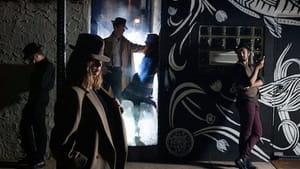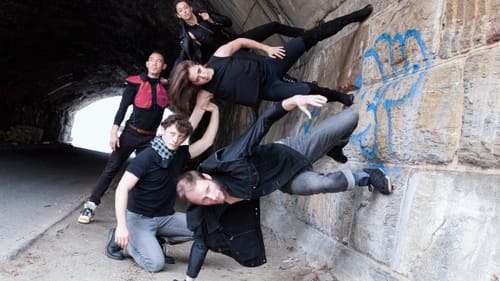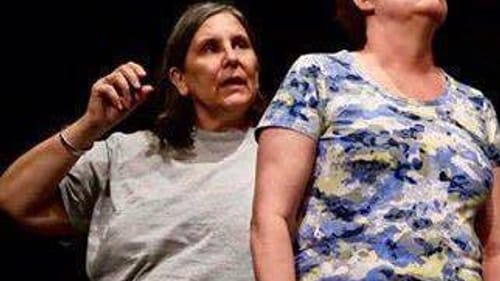Stay in the Loop
BSR publishes on a weekly schedule, with an email newsletter every Wednesday and Thursday morning. There’s no paywall, and subscribing is always free.
Improvising an improv economy
Philadelphia Theatre Company hosts "Improv Is the Future of Theater" panel discussion

A recent panel discussion at Philadelphia Theatre Company posited that “Improv Is the Future of Theater.” But in order to arrive at that future, the form will have to overcome a whole lot of roadblocks.
Philly is a theater town, always has been. Our oldest theater (and the oldest in the country) is the Walnut Street Theatre, founded in 1809. Our newest space, at the Drake, opened in 2016. We host national tours and support regional theater. Even the Fringe Festival has morphed into a venue with year-round programming.
But the costs of maintaining theater space and staging traditional theater keep going up. Society Hill Playhouse closed in 2016, after 60 years of operation, and Painted Bride Arts Center recently announced its closing. Philadelphia Theater Company (PTC), attempting to regroup after the bank foreclosed on its $11 million mortgage, is also taking a year off from staging a season.
The irony of an on-hiatus PTC hosting a panel discussion on the future of theater wasn’t addressed by any of the participants. Actually, the participants didn’t really dig into the economics of improv (and theater in general) until the Q&A period at the end.
At the moment of creation
Moderator (and BSR contributor) Mark Cofta began by asking panelists whether a definition of “theater” could include improvised performance. How important is the script to the nature of theater?
Benjamin Lloyd, artistic director of improv ensemble Bright Invention, said, “Theater is a story told live, in front of an audience.” Actor Scott Greer agreed, saying that theater’s essence is “communion between the performers and their audience, however you create that connection.”
{photo_3}
Bobbi Block, producing artistic director of Tongue & Groove Spontaneous Theater, agreed, explaining that improv — especially improv as it is usually performed in Philly — is more about relationships than plot.
The immediacy of improv, theater artist Tara Demmy said, makes it exciting for both performers and audience. Providing that immediacy is one of the challenges of conventional theater.
“What I loved about being a scripted actor,” Lloyd said, “was the moment of discovery in the rehearsal room — a moment you then spend the rest of the run trying to create.”
Performance as commodity
Traditional theater, with a script and production that remains the same from day to day, offers a definable product for sale. Nick Gillette, cofounder of Almanac Dance Circus Theatre, said that the spine of an improv show — its performers and format — is also commodifiable in long-form improv. Fans go to see a particular troupe create within a particular structure.
Dave Jadico, artistic director of Comedy Sportz, pointed out that you have a good idea what you’ll get when that structure is widely produced, as it is at his short-form venue. (Start here to learn the difference between long- and short-form improv.)
But improv’s audience attends a performance precisely because they don’t know what will happen. Block explained it’s similar to sports in that sense: you go for the thrill, not because you can anticipate specific moves and countermoves. You want to be present for the moment of brilliance that may (or may not) occur on any night.
Staging the commodity that is improv is relatively inexpensive, especially in comparison to ever-rising theater-ticket prices. Demmy ticked off the elements: small scale and easy accessibility; lack of costumes and props; low ticket prices. But, she added, it’s impossible to make a living doing it.

Who is the audience?
According to Gillette, Philly Improv Theater (PHIT) doesn’t make money on the shows it runs seven nights a week on two different stages, despite not paying its performers (a fact he didn’t address). Instead, the budget is balanced by income from the training center, where both he and Demmy teach (and where I studied).
The vast majority of long-form improv’s audience is other improvisers, occasionally augmented by friends and family of performers. Improv is a closed but growing ecosystem in which unpaid performers do it for love of the art form.
Aside from the 17 to 20 improv shows held at PHIT every week, most performed by troupes cast and directed by PHIT company members, there are several independent shows around town. Most are held monthly in bars, often in upstairs performance spaces on weeknights; the bar makes money from drink sales.
Efforts to develop shows in non-bar spaces and sell tickets never attracted enough of an audience to offset the space rental. After all, the (unpaid) performers, who get in for free, make up most of the audience.
Performers at these indie shows are mostly hobbyists: short-lived indie teams and duos. These groups come together, hire a coach, practice more or less regularly, perform at bar nights and the occasional guest spot at PHIT, then break up as members’ priorities change.

It’s impossible to know how many teams are currently active. My guess is probably two or three dozen. (One is my own team, Time Bandits, unusual in that it has existed for two and a half years, albeit with several personnel changes.)
Thus, part of the activity that makes Philly one of the top four or five improv cities in the country (according to Jadico) is the roiling pool of people paying to study and practice improv, and occasionally performing. In other words, these people are not only not getting paid, they are spending their own money (on coaches and, sometimes, practice spaces) to hone their craft and have some fun.
The future of improv
Clearly this amateur ecosystem, though it may support professional-level performance, can’t be the basis for the “future of theater.” So, what is that future?
Increasingly, performers are expected to have improv training. Most big names in comedy have come up through improv, and serious actors study it as well. In addition, though, improv can serve as a base for scripted works or can be incorporated in those works. Demmy, a Villanova M.A. candidate, appeared in the recent Mr. Burns: A Post-Electric Play, which was developed by transcribing the original creators’ improvisations.
Gillette pointed out some of the issues around creative ownership of ensemble-created works. “Intellectual-property law is decades behind,” he said; copyrights can be assigned only to individuals, not to ensembles.
And of course, given the ferment of the improv community itself, new formats of improvised performance emerge all the time. Some of these will appeal to general audiences, not just students and practitioners. Block’s Tongue & Groove Spontaneous Theater, for instance, has developed a hybrid between improv and spoken-word performance.
In response to a question from BSR contributor Naomi Orwin, Lloyd said his take on the event title, “Improv Is the Future of Theater,” is based on the lower cost of staging improvised performances. Clearly, though, given the creative and economic issues yet to be resolved, it’ll take a while before we reach that future.
What, When, Where
Panel discussion: "Improv Is the Future of Theater." Hosted by Bright Invention, Tongue & Groove, Philadelphia Theater Company. Panelists: Benjamin Lloyd, Bobbi Block, Scott Greer, Dave Jadico, Tara Demmy, Nick Gillette; Mark Cofta moderated. February 17, 2018, at the Philadelphia Theatre Company, 480 S. Broad Street, Philadelphia. (215) 985-0420 or philadelphiatheatrecompany.org. Part of Philly Theatre Week.
Sign up for our newsletter
All of the week's new articles, all in one place. Sign up for the free weekly BSR newsletters, and don't miss a conversation.

 Judy Weightman
Judy Weightman